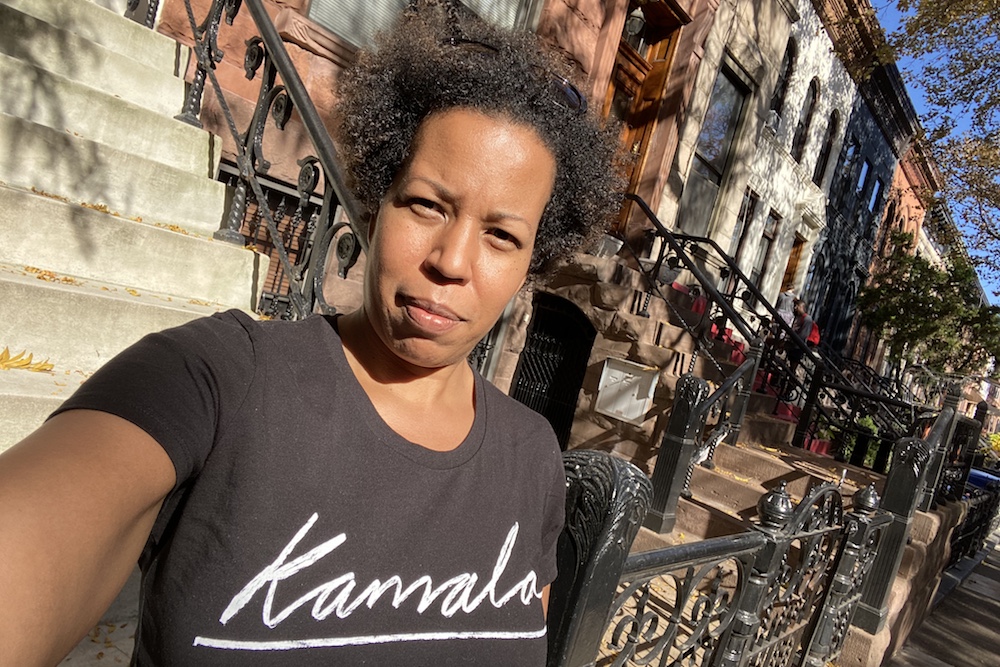
Selfie courtesy of Kimberly Peeler-Allen.
Kimberly Peeler-Allen is the co-founder of Higher Heights, an organization that builds the collective political power of Black women, and a visiting practitioner at the Center for American Women and Politics at Rutgers University. Before joining a Zócalo Twitter event, “What Does Kamala Harris’s Rise Say About America?,” she called into our green room to chat about fundraising for a candidate who’s running for office, what political operatives actually do, and cookie (or other) crumbs.
What is your favorite step in the fundraising process?
Seeing the connection between the candidate and the donor—when it happens and they feel like we are conspiring to change the world. That’s a magical moment that makes everybody feel great and then also leads to more support and more collaboration and more engagement which is really nice to see. And I think ultimately that’s what many, many fundraisers really try to do: try to create that space.
How did you get into trouble as a kid?
Not following directions from my parents. They would tell me to be home by a certain time and I would not. Or I’d forget—basically just not doing what I was told to do. I didn’t make my room, didn’t wash the dishes, that kind of stuff.
What’s the biggest misconception people have about political operatives?
That we’re all hacks. That we’re just out for the buck and aren’t actually committed to doing this work.
Did you ever hold that misconception yourself before you got into the work?
I didn’t think it was a real job. I knew that you could work in somebody’s office as a legislative aid or something like that, but didn’t know the political pieces behind it and that it’s a whole industry. I had no idea how that stuff happened, who was doing it. When I started down this path, my parents were like, “That’s not a real job,” because I didn’t know anybody who was in that space. And then I met a ton of people in that space over time.
For many people who do this work, it’s about making democracy more accessible and making it so that it actually works for people because you know how to move things forward. I think that’s where a lot of frustration [comes from]—people don’t understand the process and they’re like, “Well, this isn’t happening.” It’s like, “Well, actually, the reason that this bill hasn’t moved is because it needs cloture before it can be introduced on the floor. And that is X number of days.” Just really walking people through that process and of legislation and politics and campaigns.
What has been your best quarantine guilty pleasure?
I’ve been baking a lot. I bake and then I’m also like, “Oh, okay, I need to go for a walk. This is out of control.” But I think my biggest guilty pleasure is baking chocolate chip cookies. Between myself, my husband, and my two kids, they may last 24 hours—but most likely they do not.
What year, past or future, would you time travel to?
I don’t think I would go back. I think out of curiosity I would move forward, maybe 50 years. And I would stay exactly where I am in New York. Just to see: What are things like? How much has changed? How much has stayed the same? I think that’s where I’m curious—everything from technology to how are we dealing with each other on interpersonal skills. What is the political landscape like? Do we have flying cars? 50 years from now, sitting where I’m sitting in New York, what does that look like?
You were part of the Olori Sisterhood. What was your first experience of really powerful and productive sisterhood?
I think it was with those women. I think that for myself and so many, we’d all just kind of been flying solo. We may have seen each other and been passing each other in the halls, but hadn’t really connected the dots of how we could be supportive to each other. As we started to have these conversations and gather for tea and whatnot, it was like, “Oh, okay, so you have this client and you’re working for this person, and we need somebody to do X, Y, and Z, so let me see if I can help you get this contract.” And also, “That boss is being a jerk, so how can we put pressure for them to act right?” That connectedness was really the first time professionally I’d ever experienced that kind of camaraderie and support.
Do you have a favorite household chore?
Sweeping my floors. We don’t wear shoes in the house and I don’t like to wear socks. So when I feel stuff on the floor, on my feet, it drives me crazy. I feel a certain amount of completion: the floor is clean and I’m walking and there’s no crumbs, no dust bunnies. We have hardwood floors in the house, so it’s something that gets done multiple times a day. But I feel like, “My house is clean because my floors are not gross.” I think if one were to enjoy a household task, that would be it.



